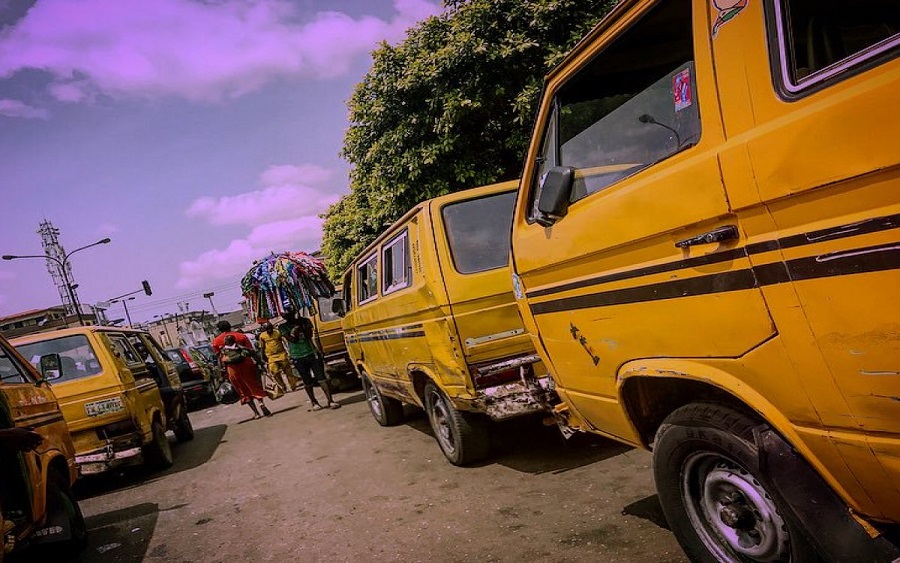Israel is a teller in a new-generation bank. He is deployed to one of the branches on Victoria Island. His resumption time is 7:20 a.m. He lives in Akoka and must navigate the Third Mainland Bridge (3MB) daily to get to the Island. Since he doesn’t own a car yet, he leaves his house very early in the morning and walks to Pako bus stop where he boards a bus either to Yaba or Sabo from where he can get a bus to Obalende or Eko Hotel in Victoria Island.
An unforgettable experience: On this fateful day, as he passed the Yabatech bus stop, he noticed the buses on the other side of the road going from Sabo to Obalende. So, he decided to alight from the bus he was in to shorten the journey as he was running late. He quickly ran to what appeared to him to be a rapidly filling bus and discovered there was one space left by the door. The person closest to the door came down and beckoned him to sit further inside. He gladly accepted the offer as the road ahead had puddles of water and he didn’t want the dirty water to splash on him. Immediately he sat down, he felt a chill down his spine and knew he had made a mistake getting onto the bus.
As the bus began its journey, the man beside him gave him a hefty slap and the sound of slaps could be heard in different corners of the bus by the passengers who were not part of the gang, leading to a minor uproar amongst them. A member of the gang whisked out a gun and this led to a sudden calm in the bus. The driver who appeared to be the leader of the gang started dishing out instructions and assuring them nobody would get hurt if they complied with his instructions. They were all dispossessed of their valuables, including phones and cash. A POS materialized and they all volunteered their PIN, and immediately all the accounts were emptied into another. As they approached the St. Dominic’s junction, the bus veered right, and they were all asked to jump out while the bus was still in motion.
Israel and his co-travelers had just fallen victim to the “one chance” phenomenon raging in metropolitan areas of the nation. This type of criminal activity is normally carried out by a gang consisting of both men and women using a car, bus, or Keke to pick up unsuspecting members of the public to rob them of their valuables. These are not kidnappers, ritualists, or terrorists; they aim to maim and dispossess unsuspecting members of the public of their valuables using the public transportation system that is the lifeblood of the city.
Origin of the crime: No one knows the exact origin of the term, but it is a popular Pidgin English phrase that means one has entered a situation that he/she is unable to immediately extricate himself from. The practice, as it is known now, became prevalent sometime in the late 90s in Lagos and has spread to other parts of the country.
The most vulnerable passengers to this dastardly act are those who board buses along routes, especially at points where there are no designated bus stops or where the buses are not required to park before picking up passengers. These unscrupulous individuals and groups take advantage of the rush associated with boarding buses in Lagos and lure unsuspecting passengers into the bus. Members of these robbery groups place themselves in “strategic” corners of the bus in such a manner that non-group members are boxed into a corner with no room to escape. Anyone that has lived in Lagos knows the buses hardly stop for you to alight or board when it is not a designated bus stop. Your ability to hop on and off a moving bus is a special skill only the Lagosian acquires over time from boarding the once ubiquitous “Molue” buses that were peculiar to the city.
Regular robbery routes: In Lagos, the most common robbery routes are Oshodi Oke, Charity, Toyota, Iyana Isolo to Mile 2, from Mile 2 to Okokomaiko, Lekki Epe expressway, Berger- Oke on the Lagos Ibadan expressway, etc. In earlier times, these incidents only happened late in the evening, but in recent times it has become more brazen with operations in broad daylight. The vehicle of choice of the “one chance” syndicate is the Toyota Sienna, especially in the mornings.
The unavailability of licensed commercial vehicles has opened a window for unregistered vehicles to enter the space for passenger traffic. This space is being exploited by these criminals, especially during rush hour, to exploit the vulnerability of Lagosians during this period.
Safer alternative: The National Union of Road Transport Workers (NURTW) or its successor organization, Lagos State Parks and Garages Committee is perhaps one of the most hated and vilified unions in Nigeria. From harassment, violent takeover of garages, extortion, intimidation, etc., the list of acts of infamy associated with the Union is endless. One thing I have always respected and for which I believe they don’t get any credit at all is the security and certainty you get from boarding buses at designated parks where they are in charge. Through a network of personal interactions and years of dealing with drivers and conductors, they have formed relationships that allow them to vouch for drivers.
New drivers intending to join new parks are not just asked to pay fees and levies; they are also required to be referenced by other well-known persons or drivers before they are allowed to pick up passengers. This semi-informal guarantor system ensures unknown persons with devious intentions do not use the park as a staging ground for their activities. Since they know the buses and their owners or drivers, you can come back to report any incidents or cases of lost personal belongings to the local chapter chairman.
Employing technology: On October 5, 2022, the Lagos State Parks and Garages, through its chairman, Alhaji Musiliu Akinsanya, popularly known as MC Oluomo, announced the introduction of a barcode to be scanned by passengers to enable them to identify the buses that are safe to board. The initiative, according to him, is to curb the incidents of kidnapping, “one chance” and other nefarious activities perpetrated using the public transport system.
The plan is for each vehicle to have a unique bar code that people would be expected to scan before boarding, and upon scanning, it will display the number of the vehicle, details of the driver, and the unit from which the vehicle is operating. This, according to the initiators of the scheme, will eliminate the incidences of kidnapping presently disrupting the transport sector.
This is a laudable idea to instill much-needed discipline into the transport sector in Lagos, but it has one very obvious shortcoming. The plan assumes that passengers have the luxury of time and space to be able to scan vehicles before they board. The hustle of getting onto a bus in Lagos as I said earlier, does not give room for such an undertaking. Also, passengers already enjoy a sense of security from boarding buses from designated parks, and requiring them to scan a QR code can only give an extra sense of security.
How to identify potential ‘one chance’ buses: So, the challenge for passengers is how to identify “one chance “vehicles or what to do to reduce the risk of being exposed to such gangs.
- As much as you can, try and board vehicles from designated bus stops and parks.
- Do a quick mental scan of the vehicle and its passengers. If you are a lady, do not board a bus with only male passengers.
- If the passengers are evenly distributed in the bus and you are being urged to go further inside, don’t board.
- Vehicles offering ridiculous or reduced fares are to be avoided or approached with extreme caution.
- Follow your instinct. If something doesn’t feel right, please don’t board.
The government’s responsibility: State governments also have a responsibility to either eliminate or regulate the activities of unlicensed individuals using their vehicles for commercial purposes. In admitting that they provide a service and help cushion the effect of the deficit of vehicles on the commuters, their activities have created the space that is being exploited by the “one chance” operators. In Lagos, a return to the assigned routes system whereby buses could only operate within assigned routes, and these routes are displayed might also help in curbing the menace.
Law enforcement can also organize sting operations to entrap these individuals, as everyone knows the hotspots they operate. The few arrests that have occurred have been due to the determination of passengers and not any action taken by law enforcement.
Public transportation is an important part of the living experience in any city. Tourists wanting to immerse themselves in the life of the locals might be desirous of taking public transportation. Issues around the security or lack of it in the public transport system can create a negative perception of the city and its people, thereby affecting tourism.













